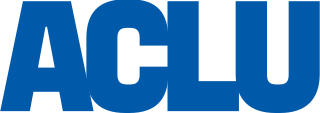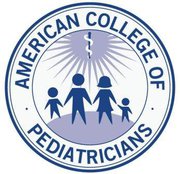Center for Civil Liberties may refer to:
Center for Civil Liberties may refer to:

The American Civil Liberties Union (ACLU) is a nonprofit organization founded in 1920 "to defend and preserve the individual rights and liberties guaranteed to every person in this country by the Constitution and laws of the United States". The ACLU works through litigation and lobbying, and has over 1,800,000 members as of July 2018, with an annual budget of over $300 million. Affiliates of the ACLU are active in all 50 states, the District of Columbia, and Puerto Rico. The ACLU provides legal assistance in cases where it considers civil liberties to be at risk. Legal support from the ACLU can take the form of direct legal representation or preparation of amicus curiae briefs expressing legal arguments when another law firm is already providing representation.
Civil liberties are guarantees and freedoms that governments commit not to abridge, either by constitution, legislation, or judicial interpretation, without due process. Though the scope of the term differs between countries, civil liberties may include the freedom of conscience, freedom of press, freedom of religion, freedom of expression, freedom of assembly, the right to security and liberty, freedom of speech, the right to privacy, the right to equal treatment under the law and due process, the right to a fair trial, and the right to life. Other civil liberties include the right to own property, the right to defend oneself, and the right to bodily integrity. Within the distinctions between civil liberties and other types of liberty, distinctions exist between positive liberty/positive rights and negative liberty/negative rights.
Lemon v. Kurtzman, 403 U.S. 602 (1971), was a case argued before the Supreme Court of the United States. The court ruled in an 8–0 decision that Pennsylvania's Nonpublic Elementary and Secondary Education Act from 1968 was unconstitutional and in an 8–1 decision that Rhode Island's 1969 Salary Supplement Act was unconstitutional, violating the Establishment Clause of the First Amendment. The act allowed the Superintendent of Public Schools to reimburse private schools for the salaries of teachers who taught in these private elementary schools from public textbooks and with public instructional materials. Lemon was a major precedent in federal and local courts until it was effectively overturned by Kennedy v. Bremerton School District in 2022.
The Fourteenth Amendment may refer to:
Civil liberties in the United States are certain unalienable rights retained by citizens of the United States under the Constitution of the United States, as interpreted and clarified by the Supreme Court of the United States and lower federal courts. Civil liberties are simply defined as individual legal and constitutional protections from entities more powerful than an individual, for example, parts of the government, other individuals, or corporations. The explicitly defined liberties make up the Bill of Rights, including freedom of speech, the right to bear arms, and the right to privacy. There are also many liberties of people not defined in the Constitution, as stated in the Ninth Amendment: The enumeration in the Constitution, of certain rights, shall not be construed to deny or disparage others retained by the people.
Civil libertarianism is a strain of political thought that supports civil liberties, or which emphasizes the supremacy of individual rights and personal freedoms over and against any kind of authority.
Civil may refer to:

The Intelligence Reform and Terrorism Prevention Act of 2004 (IRTPA) is a 235-page Act of Congress, signed by President George W. Bush, that broadly affects United States federal terrorism laws. The act comprises several separate titles with varying subject issues. It was enacted in response to the terror attacks of September 11, 2001.
Ashcroft v. American Civil Liberties Union, 535 U.S. 564 (2002), followed by 542 U.S. 656 (2004), was a decision of the United States Supreme Court, ruling that the Child Online Protection Act (COPA) was unconstitutional as a violation of the First Amendment's guarantee of freedom of speech.

Jesse Tyler Ferguson is an American actor. From 2009 to 2020, he portrayed Mitchell Pritchett on the sitcom Modern Family, for which he earned five consecutive nominations for the Primetime Emmy Award for Outstanding Supporting Actor in a Comedy Series.

Maya Lakshmi Harris is an American lawyer, public policy advocate, and writer. Harris was one of three senior policy advisors for Hillary Clinton's 2016 presidential campaign's policy agenda and she also served as chair of the 2020 presidential campaign of her sister, Kamala Harris.
The Electronic Frontier Foundation (EFF) is an international non-profit digital rights group based in San Francisco, California. The foundation was formed on 10 July 1990 by John Gilmore, John Perry Barlow and Mitch Kapor to promote Internet civil liberties.
The John Adams Project was established by the American Civil Liberties Union and the National Association of Criminal Defense Lawyers to "support military counsel at Guantanamo Bay." The United States government has detained hundreds of men at the Guantanamo Bay detention camp following the September 11 attacks and the war in Afghanistan.
The Harvard Civil Rights – Civil Liberties Law Review is a student-run law review published by Harvard Law School. The journal is published two times per year and contains articles, essays, and book reviews concerning civil rights and liberties. As of 2014, it was the leading progressive law journal in the United States. In 2009, its online companion Amicus was launched, which features standard length journal articles coupled with online responses. In 2018, the journal launched its podcast, Taking Liberties, which features panel discussions on current events related to civil rights and civil liberties, interviews with scholars and practitioners who fight for them, and tributes to those who have contributed to the advancement of civil rights throughout history.

The Islamic Education Institute of Texas (IEIT), also known as Darul Arqam Islamic School District (DAISD) and Darul Arqam Schools is a network of Islamic schools in Greater Houston, Texas, United States. The organization is a subsidiary of the Islamic Society of Greater Houston (ISGH). IEIT is headquartered in Southwest Management District in Houston.

The American College of Pediatricians (ACPeds) is a socially conservative advocacy group of pediatricians and other healthcare professionals in the United States. The group was founded in 2002. In 2005, it reportedly had between 150 and 200 members and one employee; in 2016, it reportedly had 500 physician members. The group's primary focus is advocating against abortion and the adoption of children by gay or lesbian people. It also advocates conversion therapy.
Constitutionalism in the United States is a basic value espoused by political parties, activist groups and individuals across a wide range of the political spectrum, that the powers of federal, state and local governments are limited by the Constitution of the United States and that the civil and political rights of citizens should not be violated.
Deborah N. Archer is an American civil rights lawyer and law professor. She is the Jacob K. Javits Professor at New York University and professor of clinical law at New York University School of Law. She also directs the Center on Race, Inequality, and the Law and the Civil Rights Clinic at NYU School of Law. In January 2021, she was elected president of the American Civil Liberties Union, becoming the first African American to hold the position in the organization’s history.
Centre for Civil Liberties may refer to: